Non-Executive Director’s Remuneration Report FTSE 350 Analysis
This non-executive directors (“NED”) report provides a unique perspective of NED remuneration in the FTSE 350, including how NED fees vary as a result of sector, market cap, and revenue.
We also investigated changes in committee pay to better understand how chairman and members fees vary, dependent on committee assignments.
The FTSE 350 companies are defined as at 30 June 2019. This aligns with our 2020 UK CEO Value Index report.
Sector
We undertook analysis to determine if certain sectors attracted premiums for NED pay or if in fact, NED fees are consistent across sectors. In reviewing the analysis, we must be mindful of the impact that company size has on fees.
Graph 1 shows the median chairman, NED, and senior independent director (“SID”) fees by sector (note we have tracked the median market cap per sector as a secondary reference). This demonstrates that NED and SID fees are remarkably consistent across all sectors at around £60,000 and £15,000 respectively, suggesting that sector has little impact on NED and SID fees. By contrast, chairman fees vary widely by sector even when considering the relative sizes of each sectors constituents. The consumer staples sector has the highest median chairman fees at £412,500 with the remaining sectors varying from £215,000 to £300,000.
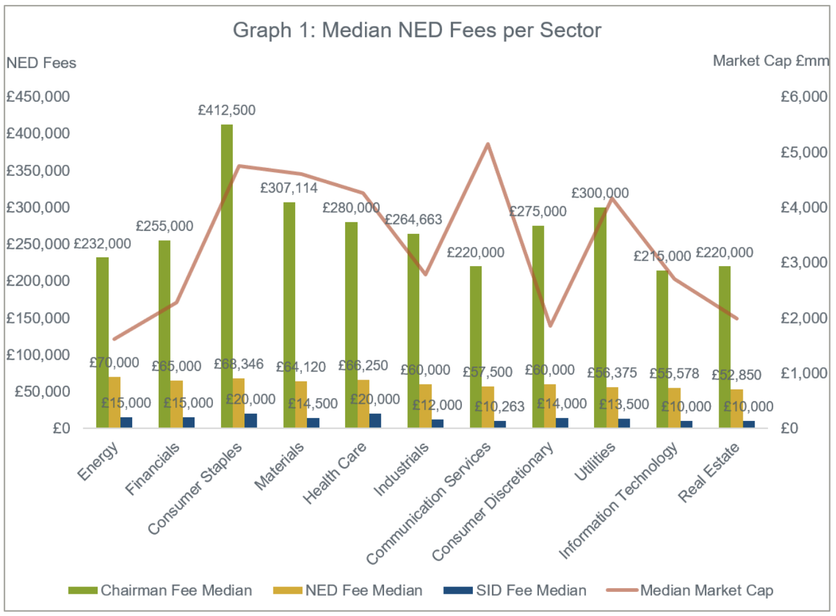
Market Cap and Revenue
Graphs 2 and 3 show the relationship between market cap and revenue on median chairman, NED, and SID fees. They highlight that both revenue and market cap have a similar relationship with pay. Overall market cap has a slightly stronger relationship as shown by the median chairman fees exponentially increasing as market cap increases compared to revenue. This is further demonstrated in Table 1 where you can clearly see as a company’s FTSE rank increases, so do their NED fees.
SID fees follow a similar pattern for both revenue and market cap, as the company’s revenue/market cap increases, so does the SID fee. However, it should be noted that the level of increase is minimal in absolute terms with the overall median fee at £15,000.
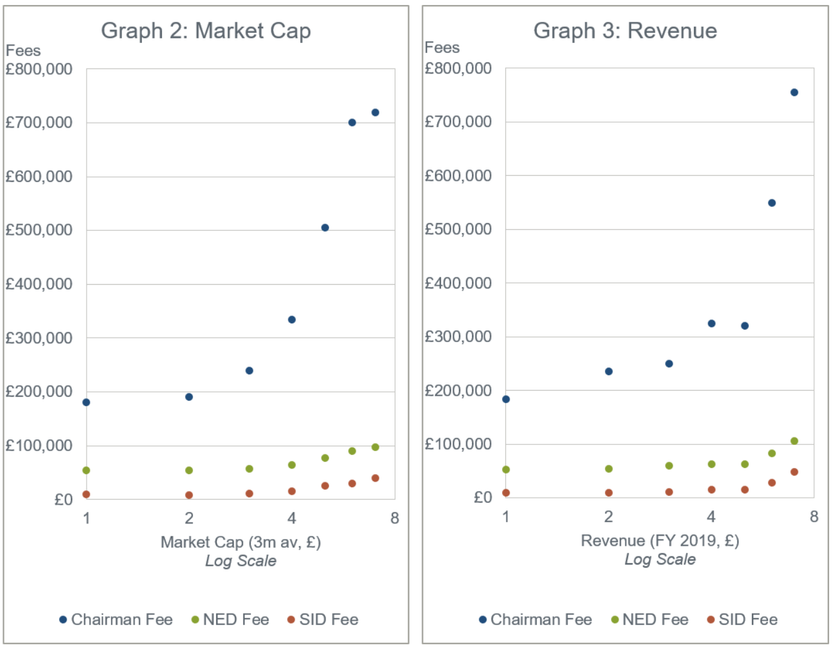
(A log scale has been applied to better visualise the data across such a wide range.)
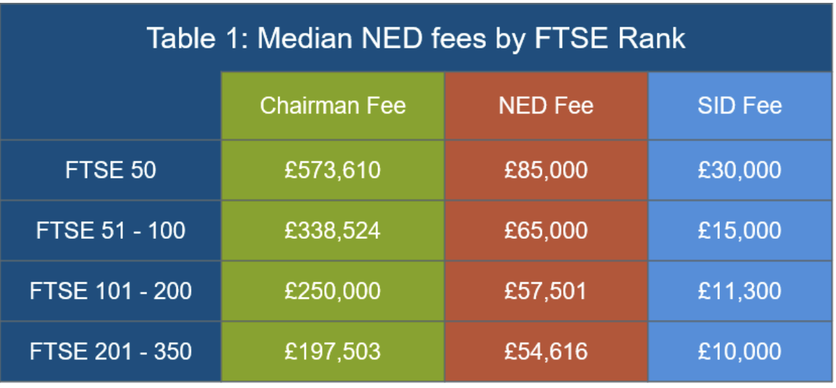
Committee Pay
When looking at how companies pay their committees, we noticed that some committees pay more than others. Graph 4 demonstrates that the risk chair has a premium on other committee chairs, paid £5,000 more at median. This is most likely a reflection of the responsibilities, time commitment, and scope of the role versus other committees. The remaining committees are relatively aligned with each other, with the nomination committee coming out just below the risk committee on chair fees. Regarding committee member fees, there is less discrepancy at the top end, with the risk, remuneration and audit committees all at £10,000. The corporate responsibility committee member fee median is the lowest at £5,045.
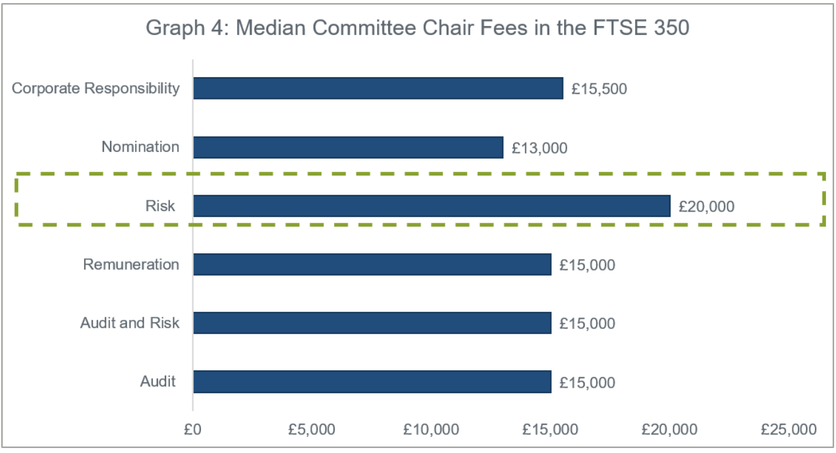
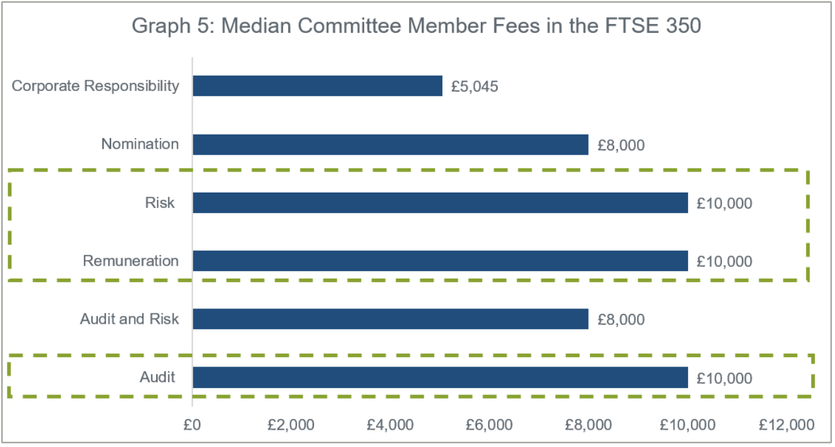
With the increased focus and investor pressure to incorporate ESG into remuneration, we also investigated the number of companies operating a safety/environmental/sustainability committee. Forty-eight companies have introduced one of these committees and we predict this number will only increase over time. These ESG committees tend to follow a similar remuneration pattern to that of the nomination committee, with the chair fees at c.£15,000 and members fees at c.£10,000.
Conclusion
Gone are the days when a chairmanship was a position to retire into, to close out a long and successful career. The demands and complexities of the role have now increased to the point where chairs must offer expertise in corporate governance, executive remuneration, and employee and investor expectations. The high-profile nature of the role coupled with ever expanding demands such as ESG concerns mean the chair must absorb responsibility for actions and decisions that sit far outside their control. By way of example, Rio Tinto’s Chairman Simon Thompson stepped down over the company’s destruction of a 46,000-year-old, sacred indigenous site in Australia. He commented “As chairman, I am ultimately accountable for the failings that led to this tragic event,” reconfirming the company’s responsibility that the chairman bears.
The Investor Association now encourages non-executive directors to own shares, as this motivates the board to think like founders. Equity for NEDs, though, cannot be in the form of performance shares or options as this is perceived to compromise an NED’s independence. Despite guidelines highlighting the benefits of aligning NEDs with shareholder interests, payment in shares remain rare in the FTSE 350.
Please note, this analysis was done prior to COVID-19, therefore the impact of the pandemic has not been reflected. That said, this analysis shows that there are several factors influencing NED and chairman fees—but the greatest is a company’s market capitalisation: the larger the market cap, the greater the chairman and NED fees. This is to be expected. As companies grow in scale, so the stewardship role grows, along with the responsibilities of shepherding more value to shareholders.
